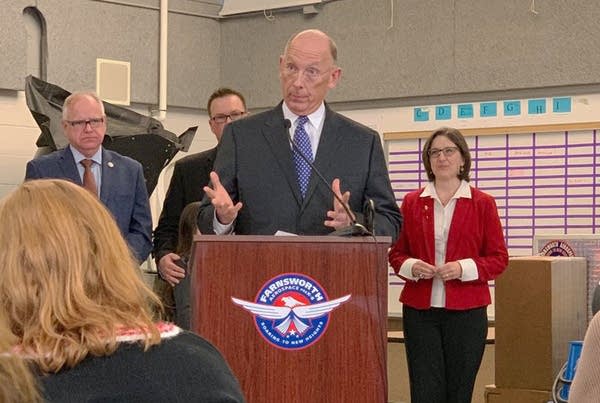Ex-corrections official disputes claims, alleges mismanagement

Go Deeper.
Create an account or log in to save stories.
Like this?
Thanks for liking this story! We have added it to a list of your favorite stories.
Updated 3:19 p.m. | Posted 11:39 a.m.
The former Minnesota corrections official who resigned while under investigation released an extended defense of her actions Tuesday, in which she also asserts she was marginalized after expressing concerns “regarding ethics and flagrant mismanagement.”
Meanwhile, Gov. Tim Walz said he has full confidence in Department of Corrections Commissioner Paul Schnell, whom the first-year governor has tasked with changing culture at the agency that operates Minnesota’s prisons.
One of Schnell’s main advisers, Sarah Walker, left her post as deputy corrections commissioner earlier this month. Last week, the agency released details of an incomplete investigation into allegations against her.
They include claims Walker lobbied for a nonprofit connected to her husband on state time and that she released confidential information about a coworker. In a statement posted online, Walker said the narrative surrounding her departure is “untethered to the facts.”
Turn Up Your Support
MPR News helps you turn down the noise and build shared understanding. Turn up your support for this public resource and keep trusted journalism accessible to all.
The investigation was never completed because Walker resigned before that occurred.
In January, Walker was picked to lead the community services division of the corrections agency, putting her in charge of reentry programs for offenders, community notification and victim services.
Materials released in connection with the investigation included text messages from Walker about a bill her husband, Brock Hunter, had before lawmakers and indicated that she reviewed his testimony on a state computer.
Walker said her advocacy for the Veterans Defense Project — a nonprofit led by Hunter — didn’t constitute lobbying. She added that the nonprofit’s initiatives were publicly endorsed by Gov. Walz and his administration, including a plan to help veterans dealing with service trauma navigate the courts.
The Veterans Restorative Justice Act “was supported by the Walz administration, and would financially benefit the DOC, which alone should make any claims that I lobbied on state time moot,” Walker wrote. “However, I did not engage in lobbying activity on behalf of that legislation.”
Walker wrote in her statement that portions of the investigation about her disclosure of sensitive information were selectively redacted to make her look bad. She says the underlying information about a colleague being groped by another corrections official at a conference was known within and outside of the agency.
According to documents, the woman told investigators that she confided in Walker. The woman said she was surprised when information about the incident, which occurred before she or Walker worked at Corrections, became public, when MPR News reported on the incident.
She said that she left the department “on my own volition and was unaware of the nature or origins of these complaints until after my departure.”
But Walker took aim at unnamed fellow corrections executives, saying she had fundamental concerns “regarding ethics and flagrant mismanagement.” She said she felt targeted after speaking up. Her statement doesn’t go into detail about what actions prompted her concern.
A request placed with a Department of Corrections spokesperson to comment on Walker’s assertion was not immediately responded to on Tuesday.
Republican state Rep. Marion O’Neill urged Walz to order a complete investigation to clear up any ambiguity about the situation surrounding Walker and her departure.

On Monday, Walz told MPR News that he has faith in Commissioner Schnell.
Walz said it’s too soon to say if Walker’s resignation signals trouble at the agency or is a unique occurrence.
“I recognize whenever you are in an agency that is experiencing change, that change can be disruptive,” Walz said. “And so I’m asking them to look at: Are there things that are happening, are there things that we’re doing, are there better things in place or is this an isolated incident where we had a deputy commissioner resign because of some of the decisions that were made?”
Walz said he is in “continuous evaluation mode” about the way executive branch agencies are run and what they do. A similar upheaval at the Department of Human Services has led to calls to break up the agency to make its mission more palatable, a suggestion Walz has said he’d be open to.
“We’re never going to be satisfied with the status quo,” Walz said in a brief interview. “We continue to relook and go back in. Whenever there is an issue or turnover, we need to go back in and look at it.”


